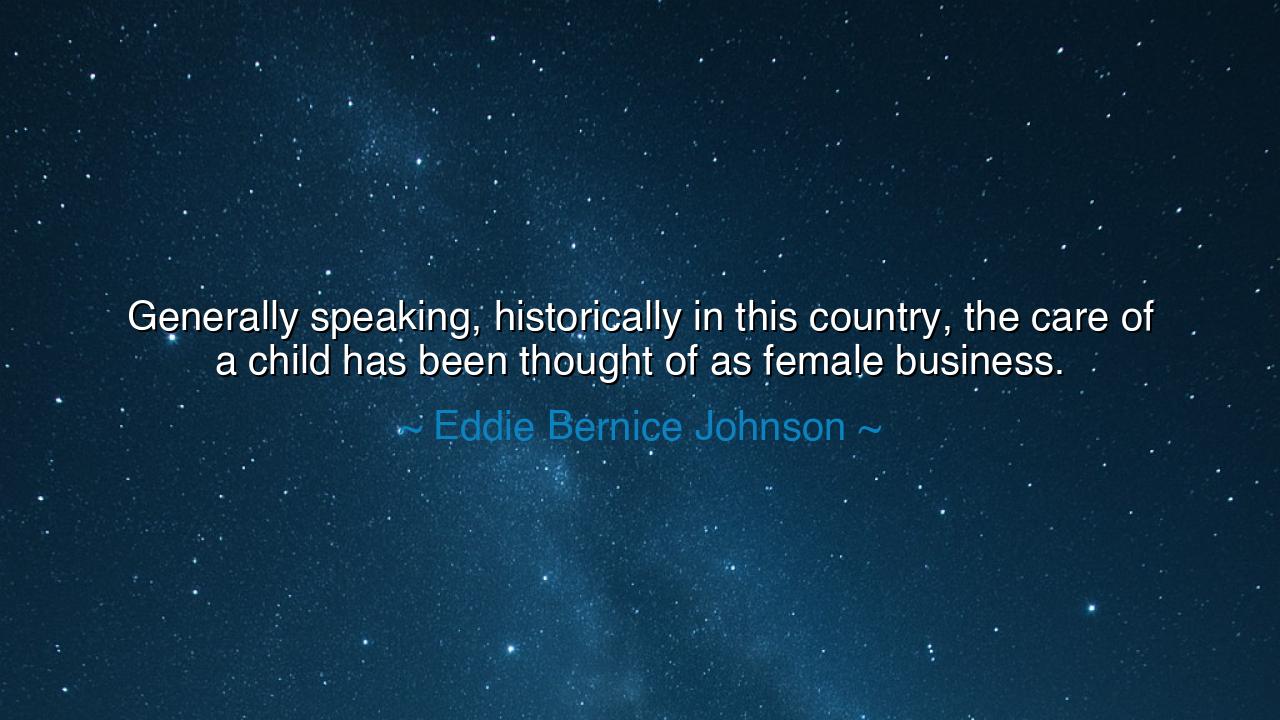
Generally speaking, historically in this country, the care of a
Generally speaking, historically in this country, the care of a child has been thought of as female business.






In the reflective and piercing words of Eddie Bernice Johnson, a pioneering congresswoman and champion of equality, we hear the quiet echo of generations: “Generally speaking, historically in this country, the care of a child has been thought of as female business.” This simple sentence carries within it the weight of centuries—the burden of custom, expectation, and unspoken sacrifice. It reminds us that while the nurturing of life is among the noblest of human labors, it has too often been confined to the shoulders of women, diminished in worth, and left unseen by the eyes of power. Johnson’s words awaken us to a truth that is both painful and redemptive: that the care of children is not the work of one gender, but the work of humanity itself.
The origin of this quote lies in the wisdom of experience. Eddie Bernice Johnson, who served with distinction in the U.S. House of Representatives for three decades, was not only a legislator but a nurse, a mother, and a voice for justice. She spoke these words in the context of advocating for better childcare, family support, and the recognition of caregiving as essential to the strength of society. Her statement reflects not condemnation, but clarity—a clear-eyed acknowledgment that for much of American history, the task of child-rearing, nurturing, and emotional labor was placed squarely upon women, while the structures of society turned a blind eye to the weight of that labor.
To say that child care has “been thought of as female business” is to uncover the ancient division of labor that has shaped human civilization. For millennia, men were cast as providers, and women as nurturers; men as builders of nations, and women as keepers of the hearth. In this arrangement, one was exalted in public, the other confined to the private realm. Yet both labored, and both suffered when imbalance turned harmony into hierarchy. The tragedy lies not in the roles themselves, but in the devaluation of nurturing, as if to raise a child were less noble than to rule a state. Johnson’s insight cuts through this falsehood, reminding us that societies rise or fall not by the strength of their armies or wealth, but by the character of those who raise their children.
Consider the story of the women who entered the workforce during World War II. As men went to battle, women took their place in factories, offices, and fields, proving that strength and skill knew no gender. Yet when the war ended, many were told to return home, to resume the quiet labor of motherhood, as though their public service had been but a temporary act. Their sacrifices were praised in rhetoric but forgotten in policy. The nation, eager to rebuild, overlooked that these same women were rebuilding the world each day—through the teaching, feeding, and nurturing of its future citizens. Here lies the irony of history: that the most essential work is often the least celebrated.
Johnson’s words, then, call us not only to remember, but to reimagine. The care of a child, she reminds us, is not “female business” but human business—a sacred duty that belongs to all. It is an act of creation that demands patience, empathy, and courage, qualities that every soul, regardless of gender, must cultivate. The time has come, she suggests, for men to share equally in the work of nurturing, and for women to be honored not despite their care, but because of it. The old world assigned care as a burden; the new world must see it as a gift and a calling—the highest service one can offer to the future.
Her words also whisper a challenge to governments and communities. If care is human business, then it must be supported, respected, and shared. No mother or father should stand alone in the sacred task of raising a child. Societies must build systems—of childcare, education, healthcare—that reflect their reverence for life. For in truth, every teacher, every nurse, every parent, every guardian of the young carries the torch of civilization. When that torch is neglected, the flame of compassion grows dim. When it is honored, it lights the way for generations to come.
And so, my children, learn the wisdom in Johnson’s words. Honor the caretakers in your midst—the mothers, the fathers, the teachers, the quiet souls whose hands shape the future while the world looks elsewhere. Do not mistake tenderness for weakness or service for servitude. The one who teaches a child to love, to think, to hope, builds a kingdom more enduring than any empire. Let every man learn to nurture, and every woman be free to lead, and the balance that was lost shall be restored.
For in the end, remember this truth: the measure of a nation is not in its monuments or its might, but in how it tends to its children. As Eddie Bernice Johnson taught, let us cast away the old belief that care is “female business,” and embrace instead the eternal law—that to care is the work of all humanity, and through that care, we build not only families, but the very soul of the world.






AAdministratorAdministrator
Welcome, honored guests. Please leave a comment, we will respond soon